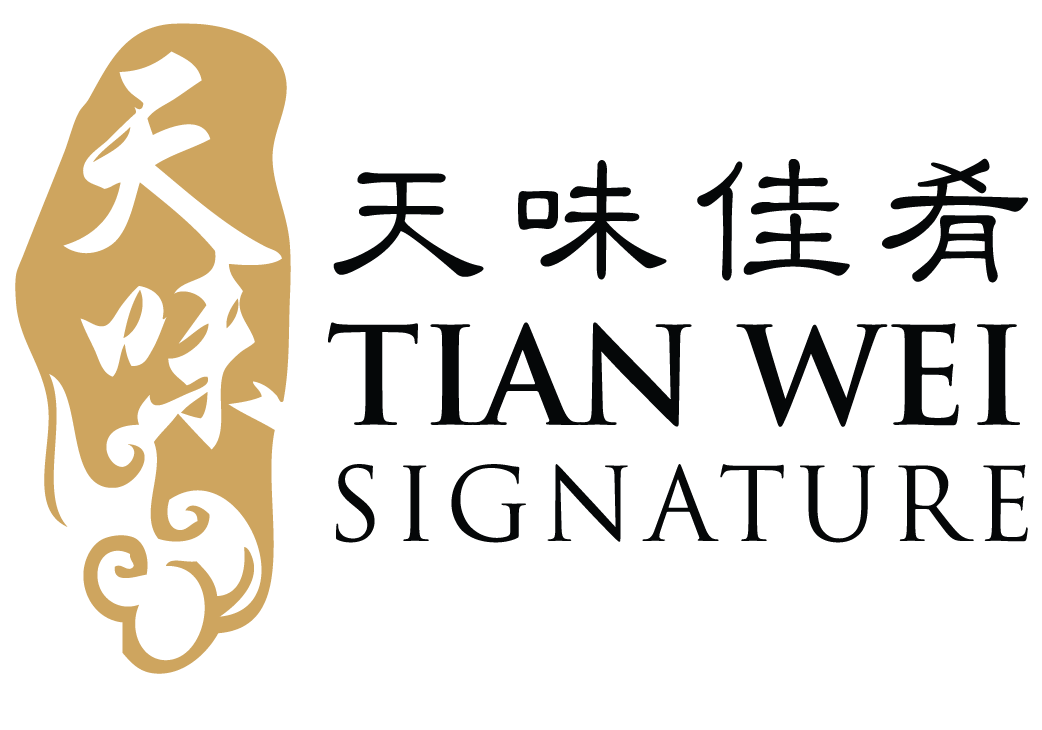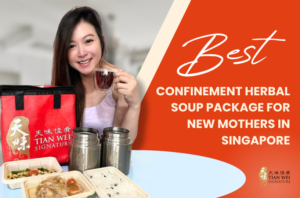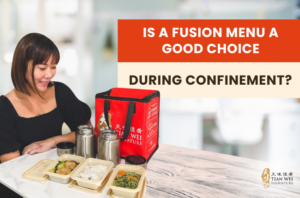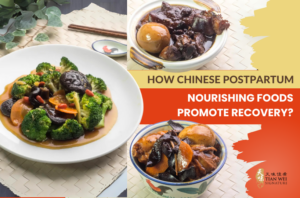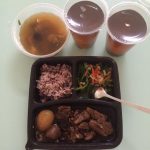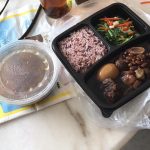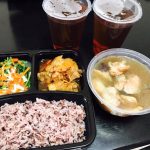81 Tagore Lane, TAG A, #01-11 Singapore 787502 ♦ Reservation : +65 6727 5599
Why Confinement Meals Matter: A Look at the Nutritional Value
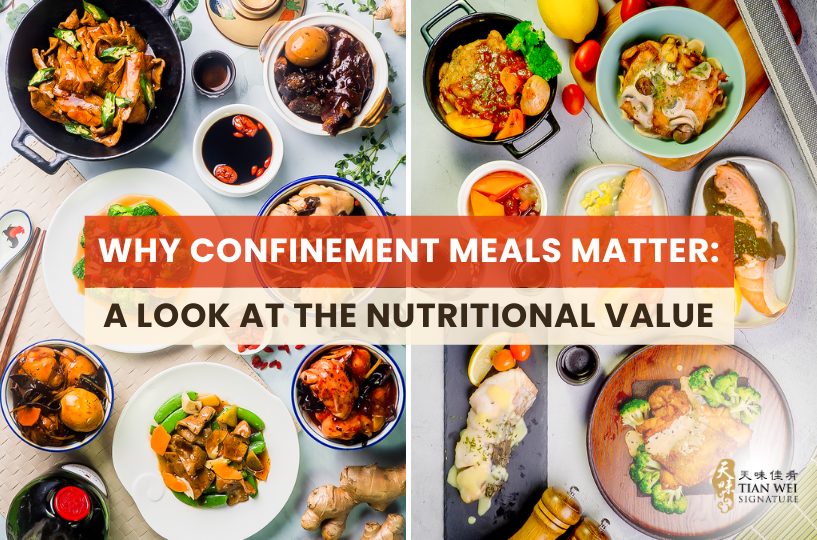
Introduction
The arrival of a new life into the world is a moment of profound joy and transformation. However, it also brings significant changes to a woman’s body, both physically and hormonally. To support the recovery and well-being of new mothers during this postpartum period, various cultures around the world have practised confinement, often accompanied by specially prepared meals, including confinement meal delivery. In this blog, we explore why confinement meals matter and the critical role they play in providing essential nutritional value during the postpartum phase.
The Postpartum Period and Confinement
The postpartum period, commonly referred to as the postnatal or puerperium phase, is the time immediately following childbirth and typically extends for about six weeks. Across many cultures, this period is considered a critical time for a woman’s recovery and bonding with her newborn. One practice that has stood the test of time in several cultures is confinement, which involves specific rituals and dietary restrictions designed to facilitate postpartum recovery.
Confinement practices vary widely from culture to culture but often share a common goal: to provide new mothers with the necessary support and nourishment during this physically demanding and emotionally significant period.
Nutritional Needs During Postpartum
Understanding the specific nutritional needs of new mothers during the postpartum period is crucial. Pregnancy and childbirth trigger substantial physiological changes, including hormonal fluctuations, blood loss during delivery, and the demands of breastfeeding. These factors create increased nutritional requirements for the body to recover effectively.
Proper nutrition during the postpartum period not only supports physical recovery but also helps stabilise mood, energy levels, and overall well-being. Adequate nourishment plays a vital role in replenishing the body’s depleted resources after pregnancy and childbirth.
The Role of Confinement Meals
Confinement meals play a pivotal role in meeting the heightened nutritional needs of new mothers during the postpartum period. These meals are carefully crafted to include ingredients that offer a combination of essential nutrients required for recovery and overall health. Additionally, they often adhere to cultural beliefs and traditions that have been passed down through generations.
One of the key aspects of confinement meals is the choice of ingredients. These ingredients are selected for their ability to address the specific needs of postpartum mothers. Whether it’s promoting tissue repair, preventing postpartum anaemia, supporting bone health, or aiding breastfeeding, confinement meals are designed to provide a comprehensive and balanced nutritional approach.
Key Nutritional Components in Confinement Meals
Let’s delve into some of the key nutritional components that are commonly found in confinement meals and their importance during the postpartum period:
1. Protein-Rich Foods
Proteins are the building blocks of the body, and they play a crucial role in tissue repair and recovery. During the postpartum phase, protein intake is essential for repairing the body’s tissues, including those that may have been stretched or strained during pregnancy. Additionally, protein supports milk production for breastfeeding mothers.
Confinement meals often include protein-rich foods such as lean meats, fish, tofu, eggs, and legumes to meet these increased protein requirements.
2. Iron and Iron-Rich Foods
Iron is vital for preventing postpartum anaemia due to iron deficiency, a condition characterised by low red blood cell count. Childbirth, especially if accompanied by blood loss, can increase the risk of anaemia. Iron-rich foods like lean meats, beans, fortified cereals, and leafy greens are commonly included in confinement meals to help replenish iron levels.
It’s worth noting that consuming iron-rich foods alongside those high in vitamin C can enhance iron absorption, further supporting postpartum recovery.
3. Calcium and Calcium-Rich Foods
Calcium is essential for postpartum bone health. During pregnancy and breastfeeding, a woman’s adequate calcium intake is essential in maintaining her bone density as her body continues to support her baby’s growth. Confinement meals often include calcium-rich foods like calcium-fortified soy products, greens, and fortified foods to meet these demands.
Vitamin D, often obtained through sunlight exposure, also plays a vital role in calcium absorption and is an important consideration for postpartum bone health.
4. Omega-3 Fatty Acids
Omega-3 fatty acids, found in fatty fish like salmon and walnuts, offer numerous benefits during the postpartum period. They support brain health, which is crucial for both mothers and infants. Adequate intake has been linked with a lower risk of postpartum mood disorders such as postpartum depression.
Balancing omega-3 and omega-6 fatty acids is important, as an excessive intake of omega-6 fatty acids can counteract the benefits of omega-3s. Confinement meals aim to include foods that maintain this balance.
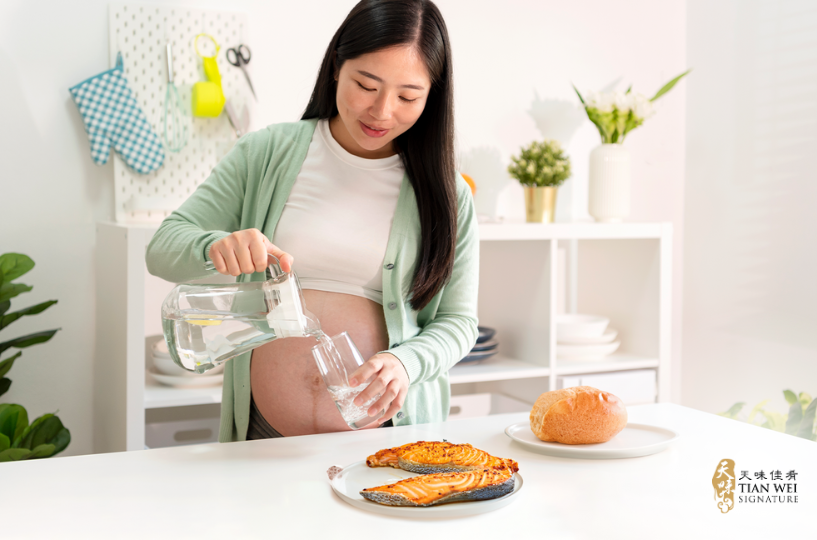
Balancing Tradition and Modern Nutrition
While tradition often guides the preparation of confinement meals, modern nutritional knowledge plays an important role in ensuring that new mothers receive the optimal balance of nutrients. It’s essential to approach confinement meals with a combination of cultural wisdom and evidence-based nutritional understanding.
Today, there is a growing awareness of the importance of balanced nutrition during the postpartum period. Healthcare professionals recommend that new mothers consult with dietitians or nutritionists to ensure they receive the right nutrients for their individual needs.
Conclusion
In conclusion, confinement meals hold significant cultural and nutritional value during the postpartum period. They provide new mothers with essential nutrients required for physical recovery and overall well-being. Whether it’s the protein for tissue repair, iron to prevent anaemia, calcium for bone health, or omega-3 fatty acids for mood support, these meals play a pivotal role in supporting mothers as they embark on their journey of postpartum recovery.
Balancing tradition and modern nutritional understanding is key to providing new mothers with the best of both worlds. As we celebrate cultural practices, we also recognise the importance of seeking professional advice to ensure that confinement meals meet individual needs effectively. Ultimately, these meals are a gesture of love and support, offering new mothers the nourishment and strength they need as they embrace the beautiful challenges and joys of motherhood.
Simplify Your Postpartum Nutrition with Tian Wei Signature
Preparing a confinement meal menu on your own, conducting in-depth nutrition research, tackling grocery shopping, and spending hours in the kitchen can be exhausting for new mothers. We understand you deserve the utmost convenience and support during this crucial time.
That’s why we offer Tian Wei Signature’s best confinement meal Singapore delivery service. Our meals are meticulously crafted, TCM (Traditional Chinese Medicine) and dietitian-reviewed, ensuring you receive the balanced nutrition you need through our confinement meal delivery. Best of all, they are delivered fresh and warm right to your doorstep, giving you more time to focus on your recovery and cherish those precious moments with your newborn. Don’t hesitate to make your postpartum journey easier – click here to explore our range of confinement meal plans and place your order today!
